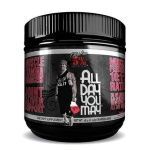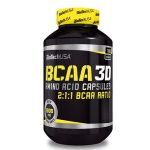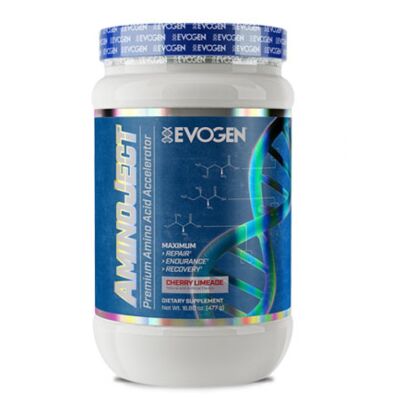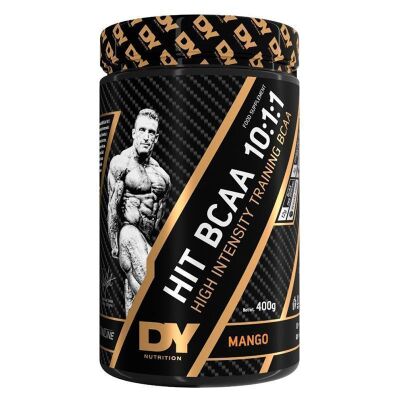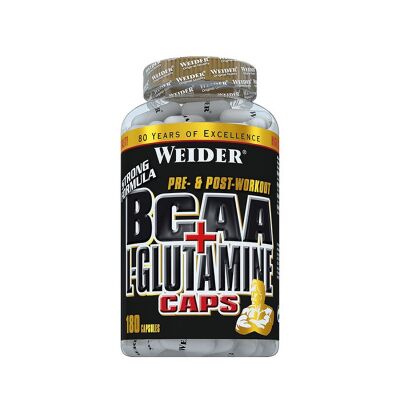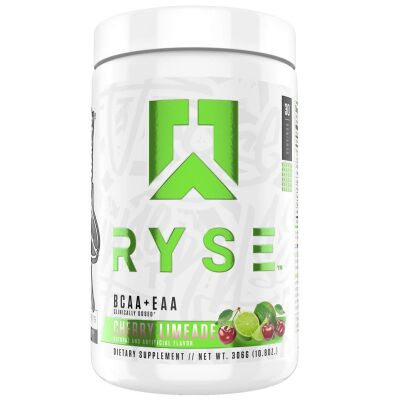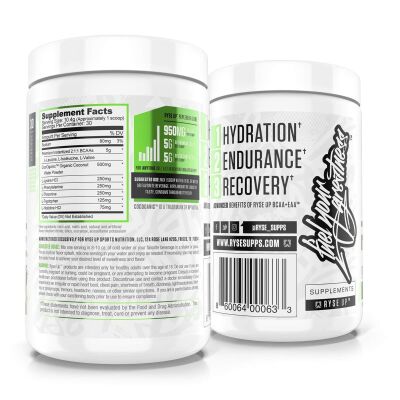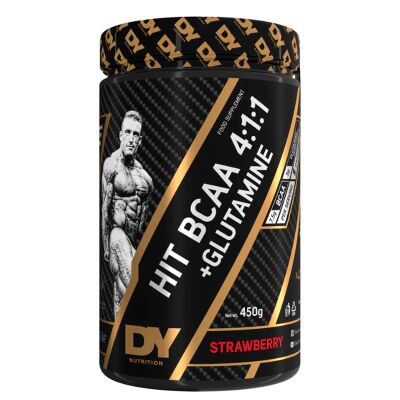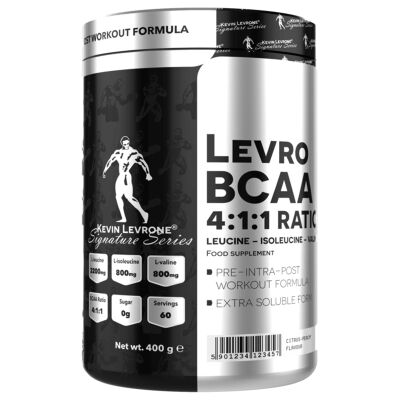BCAA´s
BCAA buy at American Supps
Synonyms: Branched Chain Amino Acids (English for branched chain amino acids)
Application: Catabolic conditions, for example in the case of severe burns
Hoped-for effect: anti-catabolic and anabolic effects, accompanying muscle building and maintenance
Proven effect: anti-catabolic and anabolic effects, accompanying muscle building or maintenance when the intake is timed correctly.
Side effects: gastrointestinal problems, increase in urine levels
Dosage range and duration of use: 1-20 g per day, depending on the goal and level of performance of the athlete, 1.2 g per day
Natural Occurrence: BCAA occur naturally in our daily diet.
What are BCAA?

BCAA is the abbreviation for Branched Chain Amino Acids, which translates as? Branched chain amino acids? means. These include leucine, isoleucine and valine. All three amino acids are considered essential, so the body cannot produce them itself and must therefore be taken in regularly through food. The term? Branched-chain? is based on the special chemical structure of these three amino acids, which are characterized by interlocking methyl groups. BCAA have been used in bodybuilding and weight training for decades and are still very popular today. No wonder, once you know about the diverse areas of application of this extremely interesting amino acid complex, which inspire both strength and endurance athletes. But one after the other.
What is the difference between BCAA and other amino acids?
Unlike other amino acids, BCAA are metabolized directly in the muscles and not in the liver. They are the building material for the two amino acids, glutamine and alanine, which are most frequently found in the skeletal muscles in terms of quantity and which are broken down particularly strongly during stressful situations, such as intensive weight training. If the glutamine and alanine levels fall too drastically, does the muscles get into a catabolic, i.e. muscle-breaking metabolic situation? the exact opposite of what the athlete actually wants to achieve. In order to get out of this catabolic hole as quickly as possible, our body now has several options. One possibility is that it metabolizes its own muscle tissue in order to obtain BCAA from it, which in turn is used for the synthesis of glutamine and alanine. Another possibility is for him to use circulating BCAA for this purpose. For this, however, you must have eaten protein-rich or BCAA as a supplement before the stress. Is the possibility simplified by the aforementioned property of the BCAA? In contrast to other amino acids, these are directly available to the muscles and do not have to go through the liver. What this means in practice is clear. Because BCAA are made available directly to the body after intensive training, from which it can form glutamine and alanine, is it less tempted to metabolize the body's own protein? thus the BCAA can be said to have an anti-catabolic effect. This is supported by the influence of leucine in the glucose metabolism. Leucine is the building block for alanine, which in turn is needed to make glucose in the liver, while a remnant of this process? the so-called? keto acid? also serves as a direct energy donor. If there is enough energy available during and after training, is there no reason for the body to compromise on its protein reserves? say: muscles? to go.
Taking BCAA after exercise
In order to benefit from this effect, BCAA supplements should ideally be taken with the post-workout shake. BCAA not only have an anti-catabolic effect at this point, but thanks to their insulinogenic effect? that means that the intake leads to an increased release of insulin, also in a certain way anabolic. A high insulin level is necessary immediately after training in order to force all nutrients such as amino acids, carbohydrates or creatine into the muscle cells as quickly as possible, which supports them in regeneration and in building new muscle substance.
BCAA in the diet
The benefit for bodybuilders and strength athletes during a mass or maintenance phase has therefore been largely clarified. However, the use of BCAA is not only beneficial here, it also turns out to be a clever move during a diet. As we have now learned, the cleverly timed intake of these amino acids can lead to a reduced breakdown of the body's own substances, and where does such an effect make more sense than during a diet? The goal of a bodybuilder while on a diet is to reduce as much body fat as possible, while increasing muscle mass? Not for aesthetic reasons, but also because it is metabolically active tissue? should be largely preserved. Athletes who are willing to take risks use anti-catabolic drugs such as steroids in this regard, which is not an option for natural athletes.
The solution is not difficult to guess: Various scientific studies have come to the conclusion that an administration evenly distributed over the day with a BCAA supplement can certainly preserve muscle mass compared to a placebo. This statement also coincides with experiences which all speak of good results in terms of muscle maintenance during a diet. In order to benefit optimally from the intake, it is important to consume BCAA regularly and throughout the day with meals.
BCAA for endurance athletes
But it's not just strength athletes who benefit from taking branched-chain amino acids? Endurance athletes can also benefit from this. As already briefly mentioned, BCAA play an important role in the energy metabolism. Leucine in particular stands out here, as it is oxidized directly in the muscles for energy purposes during exercise. This effect becomes interesting when the body's own glycogen stores are running out and energy is still required for the last few minutes of training. This is where leucine comes into play, which the muscles can use quickly and efficiently as an energy source. Endurance athletes who often run out of breath in the last few meters should test BCAA for this purpose. the? dope? BCAA is already common practice in many endurance sports, simply because it works. Bodybuilders and strength athletes benefit from this only to a limited extent, as their training units are usually shorter, usually between 45 and 90 minutes.
How is BCAA taken?
The dosages used are based on the goal pursued with the intake. Bodybuilders who want to use BCAA as an anti-catabolic and potentially anabolic supplement to their post-workout shake use around 10 g BCAA. Those who want to support their diet with the branched-chain amino acids use between 3 and 5 g in the morning, at noon, in the evening and after the workout. Endurance athletes use up to 20 g BCAA or 1 to 7 g in one liter of isotonic and carbohydrate-rich drink, depending on the length and intensity of the load. For this, however, BCAA powder is required.
Can BCAA cause side effects?
The negative side effects to be expected are, as to be expected with a completely natural supplement, within limits. Only a few reports of gastrointestinal complaints and nausea are reported. When BCAA is metabolized, ureas are produced, which can stress the organism if taken for a long time. Interestingly, this mainly occurs when BCAA are processed for energy purposes, but as an anti-catabolic supplement to the post-workout shake or with meals, the supplementation is considered safe. Only taking it on an empty stomach to increase endurance should be avoided for this reason.
The right dosage of BCAA
The estimated daily requirement of hard training athletes is estimated at 5-6 g leucine, 2 g isoleucine and 4-5 g valine, including the intake from the daily diet. In practice, it has been proven to take leucine, valine and isoleucine in a ratio of 4: 3: 2, i.e. for 4 g of leucine there are 3 g of valine and 2 g of isoleucine. Remember that the branched-chain amino acids are intertwined in their effects, so significantly increasing one of these components makes little sense.
Our conclusion on BCAA
The intended use of BCAA certainly has its place in the supplement arsenal of a serious athlete, regardless of whether the stated goal is to gain mass, maintain muscle or increase endurance. As long as the athlete always keeps in mind that the branched-chain amino acids are natural substances and not miracle drugs with steroid-like effects, their use will certainly not disappoint.
